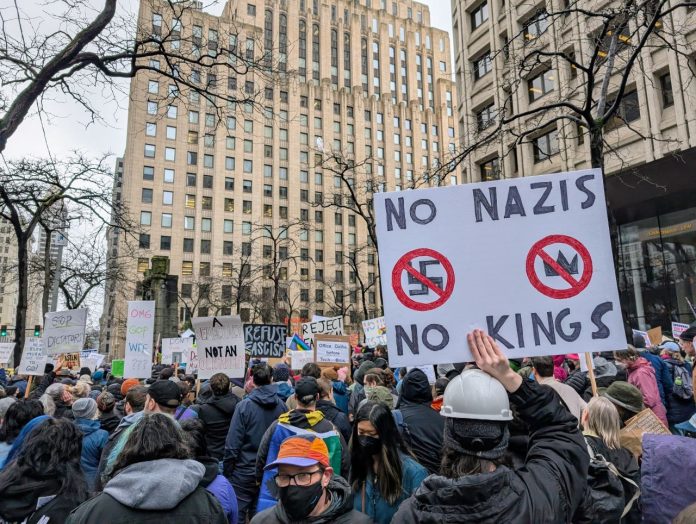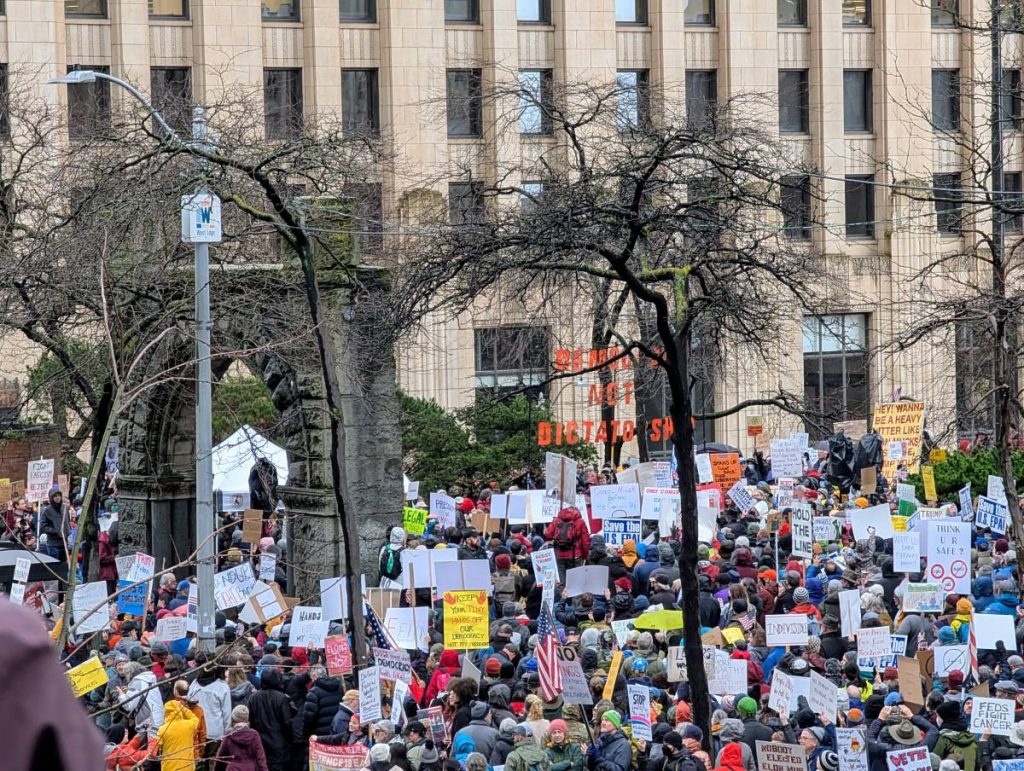
Mayor Harrell struck a more defiant tone in “State of the City” speech today, but was light on specific safeguards.
Monday was Presidents’ Day but thousands of people in Seattle did not appear to be in the mood to celebrate the current president, who they see as usurping democracy and trying to install himself as an above-the-law dictator. Seattle City Councilmember Alexis Mercedes Rinck attended the protest in Downtown Seattle outside the Henry M. Jackson Federal Building, which houses the Department of Education and Internal Revenue Service — both under attack from Trump Republicans.
“Seeing these early warning signs, I led the charge,” Rinck told the gathered crowd, which exceeded 2,000. “I called for the standing up a committee on Seattle City Council focused on federal administration and policy change. Because we know that the impacts will be robust and profound in this city. We’re seeing them already. Whether you’re a government worker, whether you depend on programs and housing or environmental protections or energy policy — every aspect of life as we know it is under attack. And we need our City engaged. We need our City working on this.”
The Trump administration has sown an incredible amount of chaos and already threatened the basic tenets of democracy in two short months, with a flurry of executive orders and actions unsanctioned by constitutional authority of the executive.
On January 31, Rinck issued her call to stand up a committee tasked with dealing with issues stemming from Trump’s second administration, such as incursions on civil liberties and raiding of funding that Congress appropriated, especially targeting Democratic-run states like Washington.
“Throughout the past week, we have seen a flurry of executive orders coming from the new presidential administration challenging the rights and livelihoods of many of our residents, and the health of our institutions,” Rinck said in her January release. “Many organizations, programs, and people within Seattle rely on federal funding to carry out their work and live healthy lives. What is clear is that major changes are underway on the federal front, and local leaders must be tuned in.”
Huge turnout to protest the abuses of the Trump administration and save the civil service in downtown Seattle. Thousands in attendance.
— The Urbanist (@theurbanist.org) February 17, 2025 at 12:42 PM
[image or embed]
King County Councilmember Claudia Balducci, who represents the Eastside cities of Bellevue, Redmond, and Kirkland, has called for a similar response at the county level.
Rinck painted these issues as urgent priorities of her constituents — she was elected to a citywide seat in November, setting a Seattle record with more than 215,000 votes in the process.
“My office continues to hear from residents about the deep concern they have about how these changes will impact our community,” Rinck continued. “As an elected leader of this city, it is time for me and my colleagues to step up. I look forward to working on practical solutions with my colleagues.”
Later that day, Council President Sara Nelson pledged formation of a select committee as Rinck proposed, but it will not begin meeting until March.

Early indications from the wave of centrist councilmembers elected in 2023 — all with Nelson’s endorsement — has been more tentative and less ready to take on the federal government.
In a recent appearance on KUOW’s Week In Review show, Councilmember Bob Kettle (District 7) found much to agree with former Republican gubernatorial candidate Bill Bryant, backing budget tightening and continuing to question the plan for social housing and the need to fund it, despite a grassroots ballot measure just winning a 25-point victory earlier this month. He found less common cause with the progressive Democrat on the panel.
Protest signs have called out oligarchy, fascism, Elon, pointed out you can't spell felon without Elon, defended US AID and other social programs from illegal interference.
— The Urbanist (@theurbanist.org) February 17, 2025 at 1:29 PM
[image or embed]
In contrast, Rinck was the only sitting councilmember to endorse the citizen-backed social housing Proposition 1A, seeing the need to increase local housing investment given the federal government’s abrogation of responsibility. Her centrist colleagues voted to be a competing measure on the ballot, hoping to divert a small amount of existing payroll tax funding instead of raising taxes on the wealthiest businesses. The gambit failed.
Rinck portrayed taking on billionaires as part of the way out of the crisis: “They want us to be angry at our immigrant and trans neighbors. But we know that billionaires are to blame for the struggles of working people in this city.”
Elon Musk, reportedly the richest man on the planet, has engineered attacks on USAID and several other federal agencies and sought to illegal impound federal apparitions to shut down any agency he liked. Musk was a frequent target for the speeches and protest signs on Monday, a poster child of a corrupted billionaire class to many in attendance.
“Local government is the last line of democracy. The city has a role to play, and it is time for our city to step to safeguard our democracy and protect this city,” Rinck said at Monday’s protest. “Continue to call upon your local leaders to be stepping up to this challenge, to make sure we’re continuing to fund and be finding ways protect these programs that people know, love, and depend on. To protect our civil liberties, it will need all of us. We know that we don’t need billionaires. We need each other.”
Crowd estimating is tough, but I'd say 3,000 easy. Maybe more. Tough to get your hands around. Also protests happening elsewhere, such as Cal Anderson Park in Capitol Hill.
— The Urbanist (@theurbanist.org) February 17, 2025 at 1:17 PM
[image or embed]
Rinck has been talking this way since she took office — going back to her inauguration speech in early December.
“The specter of a second Trump presidency isn’t just a political challenge; it’s a direct threat to families like mine and so many in this city, and that’s why what we do here in Seattle matters now more than ever,” Rinck said shortly after her swearing-in. “In a time where some would build walls, we can build bridges. When some can sow division, we can foster unity. And when some would tell you that you don’t belong, we can say loud and clear: you are home. Seattle belongs to you too, because that’s who we are. We are a city that doesn’t just talk about progress. We build it day by day, block by block, community by community.”
At the time, Seattle Mayor Bruce Harrell was talking about seeking opportunities to partner with President-Elect Trump and pledging he would not greet him “with his fist balled” due to his collaborative nature.
Harrell did strike a less collaborative and more defiant tone in his annual “State of the City” speech today, though he largely deferred to broader efforts, such as state Attorney General Nick Brown lawsuits to block some unconstitutional executive orders.
Harrell said Seattle "has the same soul, but its spirit is rising." Setting an optimistic tone.
— The Urbanist (@theurbanist.org) February 18, 2025 at 12:17 PM
[image or embed]
“Now, our office is collaborating closely with state and local government partners to provide a coordinated and very appropriate rapid response,” Harrell said. “Attorney General Nick Brown is ensuring that Washington state remains at the forefront of protecting our constitutional rights. Just last week, the city of Seattle announced that it will join local governments from around the country in suing the Trump administration over the withholding of federal funds based on our sanctuary status.”
The mayor’s earlier collaborative overtures apparently have been rebuffed by the Trump administration.
“We have a federal administration focused on division and working every day to drive us apart,” Harrell said. “I’m not being an alarmist when I say we should have great concerns for what the Trump administration has in store for our city and its people. The actions and the rhetoric coming from the White House take aim in parts of our community that we value central as to who we are, our LGBTQ+ community as an example, our trans individuals as an example, our immigrant and refugee neighbors, our women, our working families.”
Harrell also pointed to a tough budget season ahead and pledged efforts to claw back funding or defend policies under assault from Trump overreach.
“Unconstitutional executive orders and bad economic policies will mean revenue impacts and fewer resources to invest in local services that truly make a difference,” Harrell said. “So let me be clear, when Seattle’s local values and our policies and our priorities are challenged by unlawful federal actions, we will not hesitate to do everything in our power to defend our people and our rights.”
The mayor noted he has instructed City departments to continue to follow state and local law rather than bow to federal pressure to participate in mass deportation plans.
“We reject the Trump administration’s effort to commandeer local law enforcement and defund our local safety efforts by threatening grants that supported investigations into some of our critical areas: sexual assault, child exploitation, domestic violence services for our survivors, 911 dispatch,” Harrell said. “Before the change in administrations, I issued a mayor directive making clear that SPD and City employees will continue to follow state and local laws serving all residents, no matter their immigration status, we will continue to work with our immigrant community, making sure they know their rights and they have our support.”
Doug Trumm is publisher of The Urbanist. An Urbanist writer since 2015, he dreams of pedestrian streets, bus lanes, and a mass-timber building spree to end our housing crisis. He graduated from the Evans School of Public Policy and Governance at the University of Washington in 2019. He lives in Seattle's Fremont neighborhood and loves to explore the city by foot and by bike.

